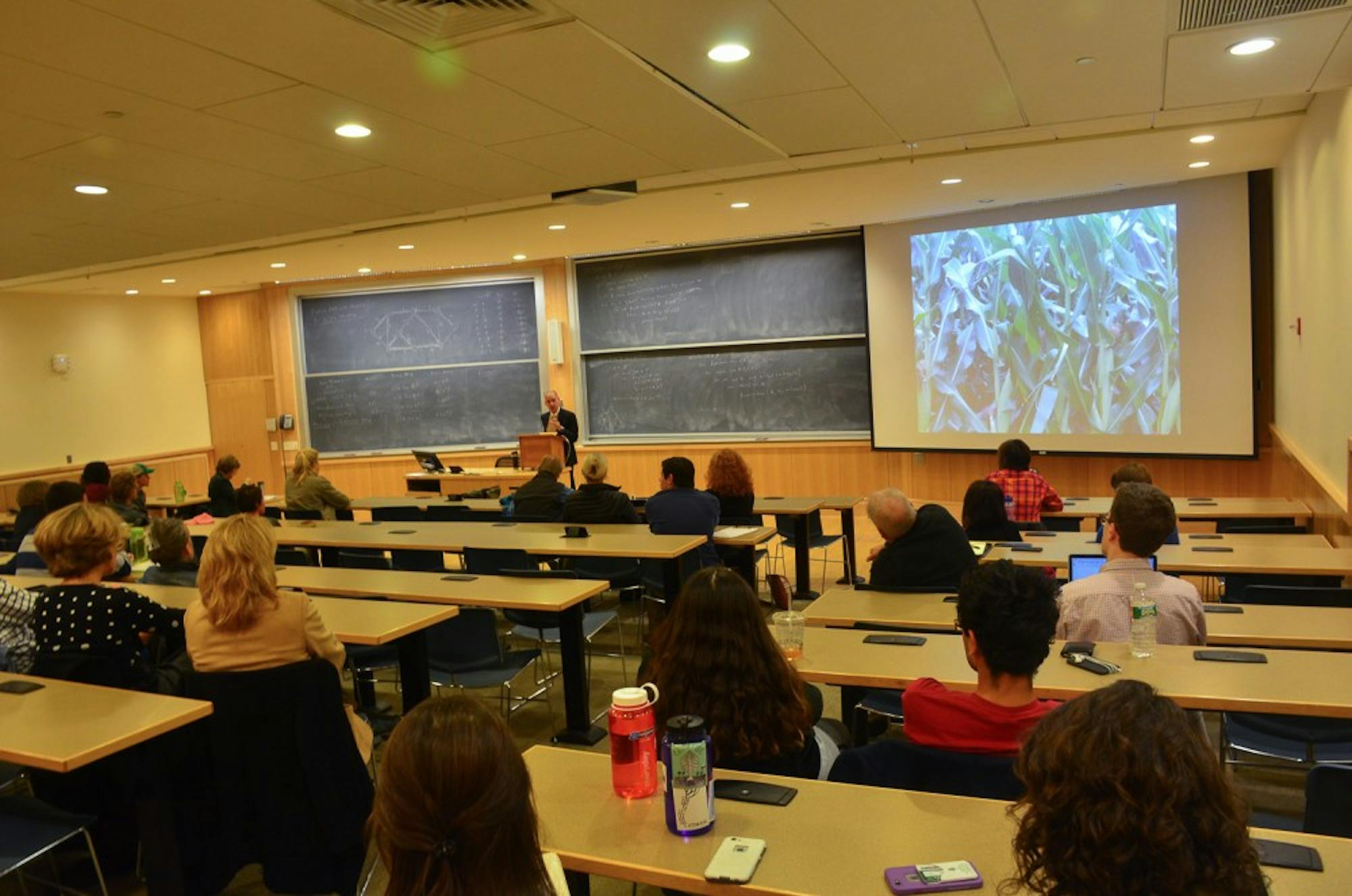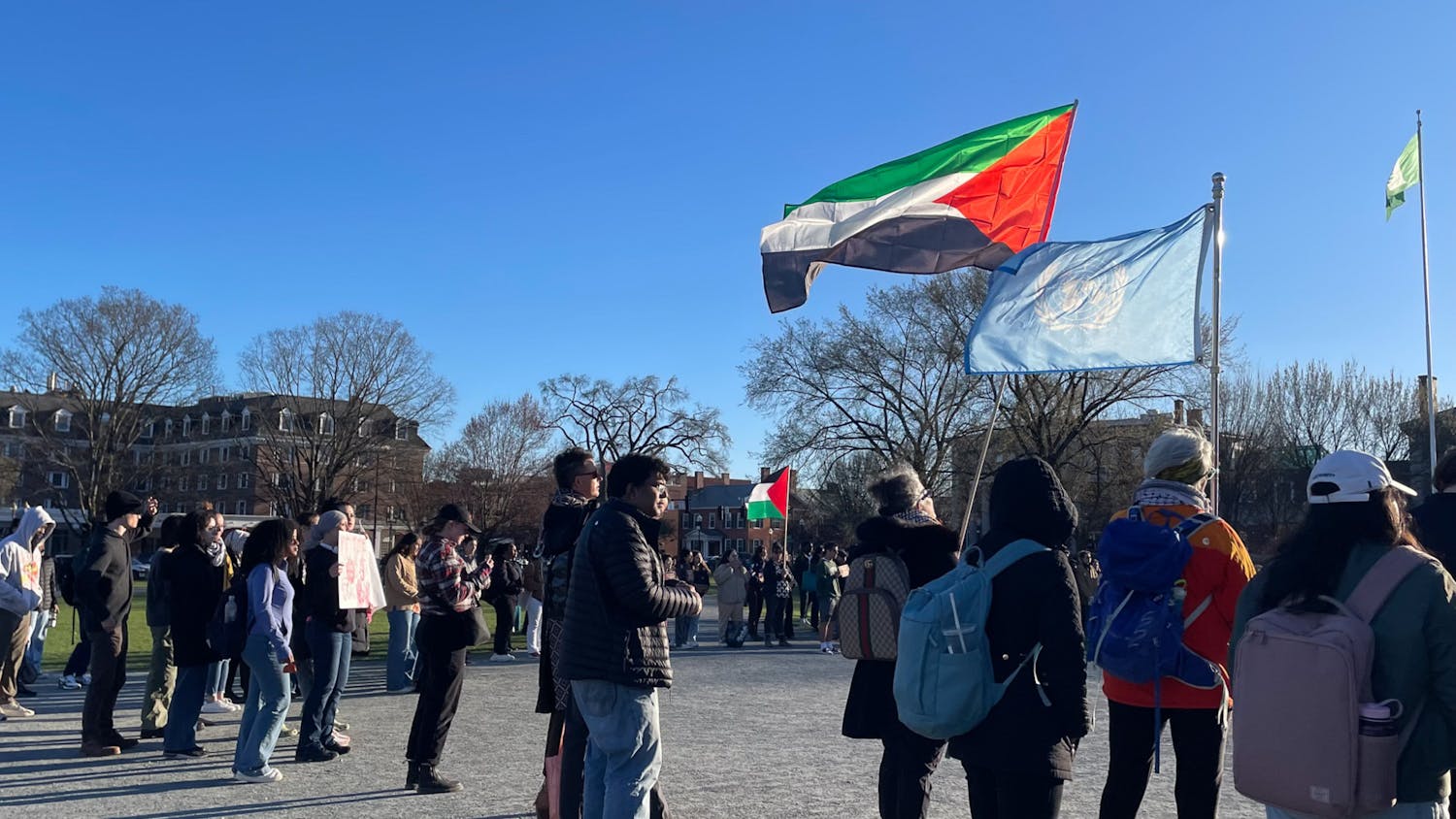The United States Agriculture Department spends 99 percent of its budget on the “junk food diet” — mostly agricultural subsidies that will eventually result in the production of unhealthy food — even as it establishes guidelines for a healthy diet, Ricardo Salvador, director of the food and environment program at the Union of Concerned Scientists, said at a talk on food sustainability yesterday.
Dartmouth concluded its Food Day celebrations yesterday with Salvador’s presentation, titled “The Only Viable Future,” during which he advocated for removing $11 billion in these annual government subsidies for crops such as soybeans and corns.
The lecture marked the end of Food Day events, a month that included visits to local Upper Valley farms, a celebration at the Dartmouth Organic Farm, a screening of “Food Chains” — a documentary on the food industry — and a “Harvest Dinner” at the Class of 1953 Commons with food from local vendors.
Food Day is led by Dartmouth Dining Services, but planning also involved a group of students and faculty.
For the past two years, DDS dietitian Beth Rosenberger and Dick’s House nutritionist KC Wright have been responsible for most of the planning for Food Day events, DDS associate director Don Reed said.
Dartmouth has scored very highly for measures of food sustainability — for example, the Sierra Club ranked Dartmouth as the college with the most sustainable food practices, though the College earns a 69th-place ranking in overall sustainability.
In interviews, Reed and Salvador said that sustainable food practices could increase the price of food on campus. Nonetheless, Salvador stressed the importance of paying what he believed was a just price for food.
“If you believe that healthful food is a right for everyone, then you would want to ensure that everyone has adequate economic opportunity to benefit from the healthful food supply,” he said.
Reed said the DDS criteria for sustainability included whether food was locally or regionally sourced. Reed also noted that finding available local ingredients was more difficult for a large dining hall like ’53 Commons as opposed to the Collis Cafe, which can afford local ingredients due to its smaller size.
Salvador’s lecture — which had an audience of between 40 and 50 — touched on a broad range of topics, including environmental science, history, politics and economics. Salvador argued that the United States’ current agricultural system has warped priorities that lead to adverse health effects for consumers, as well as an undue economic advantage for farmers of large monocrops like soybeans and corn.
“In the monocrop system, no matter what goes wrong, the federal government will keep you in business,” he said.
In particular, Salvador criticized the fact that subsidies often flow to the large-scale agriculture industry.
“It is the single most distorted system in market economics,” he said. “These are large corporate farmers. They’re the business most capable of sustaining themselves in a natural market, and we’re subsidizing them.”
Instead, Salvador proposed increased federal support for growing fruits and vegetables, which he said would only cost $90 million. Today, he said, just 0.45 percent of agricultural subsidies fund production of fruits and vegetables.
In addition, Salvador highlighted the current mistreatment of people who are part of the food production process, particularly farm workers.
“Farm laborers have no guarantees to protect their occupational safety,” he said. “They can be sprayed with toxic pesticides. There’s an exemption from labor regulations that allows children of farm workers as young as 12 to work, when school is otherwise mandatory for children that young. For farm workers, there’s no such things as overtime pay, workmen’s [compensation], retirement benefits or medical benefits,” he said.
Salvador is also working on a campaign for the Union of Concerned Scientists called Plate of a Nation. The campaign, which has Salvador working alongside figures such as former New York Times food writer Mark Bittman, is meant to raise awareness about the importance of a just and environmentally-friendly food system.
As a practical matter, Salvador advocated executive presidential action to circumvent Congress to implement what he viewed as a fairer and more sustainable food system.
Salvador was invited to campus by environmental studies professor Anne Kapuscinski, who served on the Food Day planning group. Kapuscinski first met Salvador while serving in her current position on the board of the Union of Concerned Scientists, she said.
Salvador first visited Dartmouth to speak to “Environment and Society,” a course that Kapuscinski was teaching.
Salvador’s lecture was also part of a speaker series run by the environmental studies program called the Sustainability Solutions Cafe, which is in its fourth year. The Cafe first arose out of an interest by students and faculty to hear about innovative solutions for achieving sustainability, Kapucinski. This year’s events focus on solutions to climate change.
The Union of Concerned Scientists is a policy organization that bases its policy recommendations on scientific analysis.




